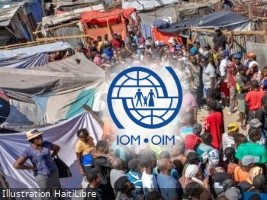Haiti is grappling with a historic displacement crisis, as over 1.4 million people have been forced to flee their homes in 2025 due to escalating violence and instability. This staggering figure, reported by the International Organization for Migration (IOM), marks a 36% increase since the end of 2024 and represents the highest number of displaced persons ever recorded in the country. Grégoire Goodstein, IOM Chief of Mission in Haiti, emphasized the urgent need for a robust international response, stating, ‘The severity of this crisis demands intensified efforts to provide sustainable solutions that restore dignity, resilience, and alternatives for affected Haitians.’
The crisis extends far beyond the capital, Port-au-Prince, with nearly 64% of new displacements occurring in regions such as the Central and Artibonite departments. Overcrowded reception centers and a surge in spontaneous displacement sites—now numbering 238—have exacerbated the strain on local communities, which host approximately 85% of displaced individuals. Women and children, who make up more than half of the displaced population, are particularly vulnerable, with many families resorting to sending children to safer areas with relatives.
Along the Haiti-Dominican Republic border, tensions have risen as over 207,000 deported Haitians have returned to a country plagued by gang violence. In response, IOM has expanded its operations beyond Port-au-Prince, providing emergency shelter, clean water, healthcare, mental health support, and livelihood assistance to vulnerable families. The organization is also collaborating with authorities and communities to enhance security and resilience through education, employment programs, and infrastructure rehabilitation.
As humanitarian needs continue to mount, IOM has called on the international community to increase funding and improve aid access. Without immediate and sustained support, the suffering of hundreds of thousands of displaced Haitians will only deepen, underscoring the critical need for both emergency assistance and long-term solutions to address the root causes of displacement.
